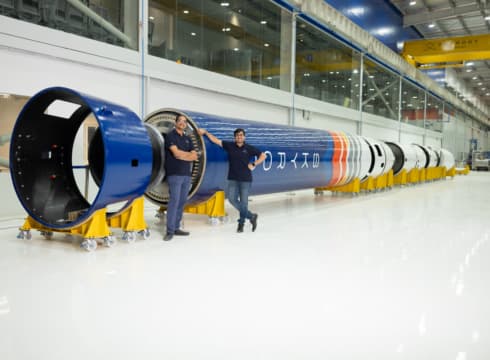Slated for an early 2024 launch, Vikram-I is a multi-stage launch vehicle that can carry payloads of up to 300 kg to low-earth orbits
The seven-storey-tall Vikram-I is Skyroot’s second rocket after the successful launch of the Vikram-S rocket in November last year
Skyroot’s new HQ spans 60,000 sq ft and is touted as India’s largest private rocket development facility under one roof
Inc42 Daily Brief
Stay Ahead With Daily News & Analysis on India’s Tech & Startup Economy
Spacetech startup Skyroot Aerospace on Tuesday (October 24) unveiled its indigenously built rocket Vikram-I at its new headquarters. Minister of State (MoS) for Science and Technology Jitendra Singh inaugurated the startup’s new headquarters, MAX-Q Campus, at the GMR Aerospace and Industrial Park in South Hyderabad.
“An incredibly proud moment as we reveal the Vikram-I orbital space launch vehicle, graced by Hon. MoS @DrJitendraSingh, visiting our new headquarters, the MAX-Q, which is potentially one of the world’s largest private rocket factories under a single roof,” read Skyroot’s official handle on X, formerly Twitter.
As per the startup, the facility spans 60,000 sq ft and is touted as India’s largest private rocket development facility under one roof.
On the other hand, Vikram-I is a multi-stage launch vehicle that can carry payloads of up to 300 kg to low-earth orbits. Slated for an early 2024 launch, Vikram-I boasts of an all-carbon fibre body and a 3D-printed liquid engine that can carry multiple satellites into Earth’s orbit.
The seven-storey-tall Vikram-I is Skyroot’s second rocket after the successful launch of the Vikram-S rocket in November last year.
Meanwhile, the spacetech startup’s new address in Hyderabad has integrated design, manufacturing and testing facilities for building space launch vehicles. This location will be the hub for the company’s 300-member workforce.
“Every rocket, during its travel to space, has to push through a point of maximum stress called ‘Max-Q’. Our MAX-Q headquarters serves as a powerful symbol of our unwavering commitment to pushing boundaries and accomplishing the extraordinary, all in pursuit of our mission to Open Space For All,” Skyroot Aerospace cofounder and CEO Pawan Chandana said.
Chiming in, the minister said, “Skyroot is not only an example of India’s superlative talent and scientific acumen but it also has a message for all of us that a huge potential was lying dormant for several decades before Prime Minister Narendra Modi came and broke the taboos of the past and opened India’s space sector for public private partnership (PPP).”
Addressing the gathering, MoS Singh said that the ‘unshackling’ of the space sector has led to a startup boom, adding that the number of startups in the country has risen from single digits to 150 currently.
Touting Skyroot’s success, he added that the venture will pave the way for more Indian youth to set up new companies in new and emerging sectors such as spacetech.
Founded in 2018 by Chandana and Naga Bharath Daka, Skyroot builds space launch vehicles. It became the first Indian private company to launch a rocket into space in November 2022.
The startup last raised $51 Mn (over INR 400 Cr) as part of its Series B funding round led by Singapore’s sovereign wealth fund in September 2022. It is also backed by names such as WorldQuant Ventures, Graph Ventures, and Meraki Labs.
The spacetech startup reported a standalone net loss of INR 55.2 Cr in the financial year 2022-23 (FY23) against an operating revenue of INR 44 Lakh during the period.
Skyroot operates in the nascent Indian spacetech industry, which has seen the emergence of a host of new players in the past few years. As per Inc42, India is home to more than 150 spacetech startups that bagged more than $285 Mn in funding between 2014 and 2023.
{{#name}}{{name}}{{/name}}{{^name}}-{{/name}}
{{#description}}{{description}}...{{/description}}{{^description}}-{{/description}}
Note: We at Inc42 take our ethics very seriously. More information about it can be found here.


